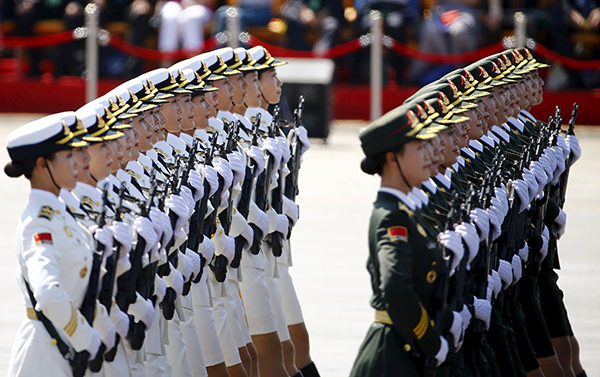First V-Day military parade justified
Updated: 2015-12-30 08:54
By Feng Wei(China Daily)
|
|||||||||
 |
|
Female soldiers of China's People's Liberation Army (PLA) march during the military parade to mark the 70th anniversary of the end of World War Two, in Beijing, Sept 3, 2015. [Photo/www.news.cn] |
The year 2015 saw China organize a series of activities to commemorate the 70th anniversary of the triumph of the Chinese People's War of Resistance against Japanese Aggression (1937-45).
China has held a military parade in Beijing every five or 10 years on the National Day on Oct 1 after 1949, the year when the People's Republic of China was founded. But it made an exception this year, holding the V-Day military parade in Beijing on Sept 3. Many of its former allies in World War II, such as Russia, also celebrated the hard-won victory in the anti-fascist war this year.
China's commemoration of the victory in the anti-fascist war may have confounded many countries. But China had every reason to make its wartime sacrifices in and contributions to the anti-fascist war known to the wider world in 2015.
For long, many have attributed Japan's surrender in WWII to the two atomic bombs that the United States dropped on Hiroshima and Nagasaki in 1945, and the Soviet Union's intervention in the Far East battlefield. But the truth is, Japan's failure was scripted even before the US dropped the first atomic bomb on Japan, as former British prime minister Winston Churchill has written in his book The Second World War.
Churchill's viewpoint has been echoed by Douglas MacArthur, the US general who commanded the Allied forces in the South Pacific during WWII and accepted the surrender of Japan. Rana Mitter, a professor of History and Politics of Modern China at Oxford University and author of Forgotten Ally: China's War with Japan, believes that the war in Europe would have been much more complicated without China's eight-year war of resistance against the Japanese aggressors, in which the Communist Party of China played the key role.
And as Atsushi Koketsu, vice-president of Japan's National Yamaguchi University, has said, China's central role in Japan's defeat has often been ignored.
Related Stories
Chinese military parade a display of peace 2015-09-03 14:42
Military parade: facts & figures 2015-09-04 07:56
Female honor guards train for military parade debut 2015-08-26 08:56
Foreign reporters invited to training base of China's military parade 2015-08-23 06:44
Military parade to highlight peace commitment 2015-03-04 07:48
Victory Parade is of great significance for the world 2015-09-24 08:44
Today's Top News
Inspectors to cover all of military
Britons embrace 'Super Thursday' elections
Campaign spreads Chinese cooking in the UK
Trump to aim all guns at Hillary Clinton
Labour set to take London after bitter campaign
Labour candidate favourite for London mayor
Fossil footprints bring dinosaurs to life
Buffett optimistic on China's economic transition
Hot Topics
Lunar probe , China growth forecasts, Emission rules get tougher, China seen through 'colored lens', International board,
Editor's Picks

|

|

|

|

|

|







